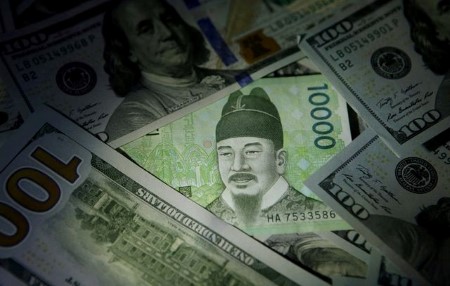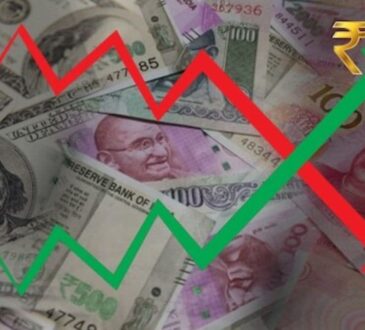
Corrects to Monday from Tuesday in first paragraph
US dollar strength prevails
S. Korean won, Philippine peso top laggards
Asian equities largely weak
By Roushni Nair
April 15 (Reuters) –Most Southeast Asian markets were subdued on Monday as rising tensions in the Middle East and a potential delay in interest rate cuts by the U.S. Federal Reserve kept the dollar buoyant, triggering an aversion to riskier emerging market assets.
The South Korean won KRW=KFTC, the Philippine peso PHP=, and the Malaysian ringgit MYR= eased the most, with each falling between 0.2% and 0.7% by 0333 GMT. Stocks in Singapore .STI and the Philippines .PSI lost more than 1%.
Market bets on near-term interest rate cuts by the Fed have declined after data last week showed U.S. consumer prices increased more than expected in March. The Fed’s shift to hawkish rhetoric in March meeting minutes led investors to price in a rate cut in September rather than in June.
That pushed the U.S. dollar nearly 2% higher last week, with the dollar index =USD – a measure of the greenback against six major rivals – currently hovering around Friday’s high at 105.970. USD/
In Asia, the Philippines’ peso hit its lowest level since Nov. 2, with the country’s inflation basket likely to be the most sensitive to the recent spike in oil prices, according to analysts at Barclays.
“Higher oil prices are generally negative for economic activity in the region, but our estimates suggest a USD10/bbl increase in Brent only reduces GDP growth by a relatively modest 0.1-0.2 percentage points (pp) for most of Emerging Asia,” the Barclays note said.
In Malaysia, the ringgit stood at a near two-month low, although the country stands out as the only net oil and gas exporter among the major emerging Asian economies and could be a beneficiary of higher oil prices. Equities in Kuala Lumpur .KLSE slipped 0.5%.
In India – another net importer of oil – the rupee INR=IN was largely range-bound with rising oil prices expected to further pressure the currency. Stocks in Mumbai .NSEI slipped 0.8%.
Investors now keenly await the country’s wholesale price index (WPI) data for March due later in the day.
“We expect WPI-based inflation to remain broadly stable in the month, with sequential decline in food prices offset by rise in international crude oil and coal prices,” Barclays analysts said in a separate note.
In China, the yuan CNY=CFXS traded flat while stocks in Shanghai .SSEC rose more than 1%.
The Chinese central bank on Monday kept a key policy interest rate steady as widely expected when rolling over maturing medium-term loans.
Investor focus now shifts to first-quarter gross domestic product data due on Tuesday for more information on the status of a recovery in the world’s second-largest economy and Southeast Asia’s biggest trading partner.
HIGHLIGHTS:
** Malaysia’s palm oil inventories fall to 8-month low
** Markets in Indonesia, Thailand closed for public holiday
** U.S. earnings disappoint, JPMorgan Chase misses expectations
|
Asia stock indexes and currencies at 0456 GMT |
||||||
|
COUNTRY |
FX RIC |
FX DAILY % |
FX YTD % |
INDEX |
STOCKS DAILY % |
STOCKS YTD % |
|
Japan |
JPY= |
-0.34 |
-8.28 |
.N225 |
-1.09 |
17.44 |
|
China |
CNY=CFXS |
-0.02 |
-1.95 |
.SSEC |
1.21 |
2.72 |
|
India |
INR=IN |
-0.03 |
-0.28 |
.NSEI |
-0.82 |
2.78 |
|
Indonesia |
IDR= |
– |
-2.81 |
.JKSE |
– |
0.19 |
|
Malaysia |
MYR= |
-0.17 |
-3.87 |
.KLSE |
-0.42 |
6.18 |
|
Philippines |
PHP= |
-0.28 |
-2.42 |
.PSI |
-1.26 |
1.95 |
|
S.Korea |
KRW=KFTC |
-0.60 |
-6.92 |
.KS11 |
-0.55 |
0.44 |
|
Singapore |
SGD= |
+0.13 |
-2.98 |
.STI |
-1.07 |
-1.79 |
|
Taiwan |
TWD=TP |
-0.20 |
-5.02 |
.TWII |
-1.13 |
14.34 |
|
Thailand |
THB=TH |
– |
-6.28 |
.SETI |
– |
-1.38 |
Reporting by Roushni Nair in Bengaluru; Editing by Jamie Freed




